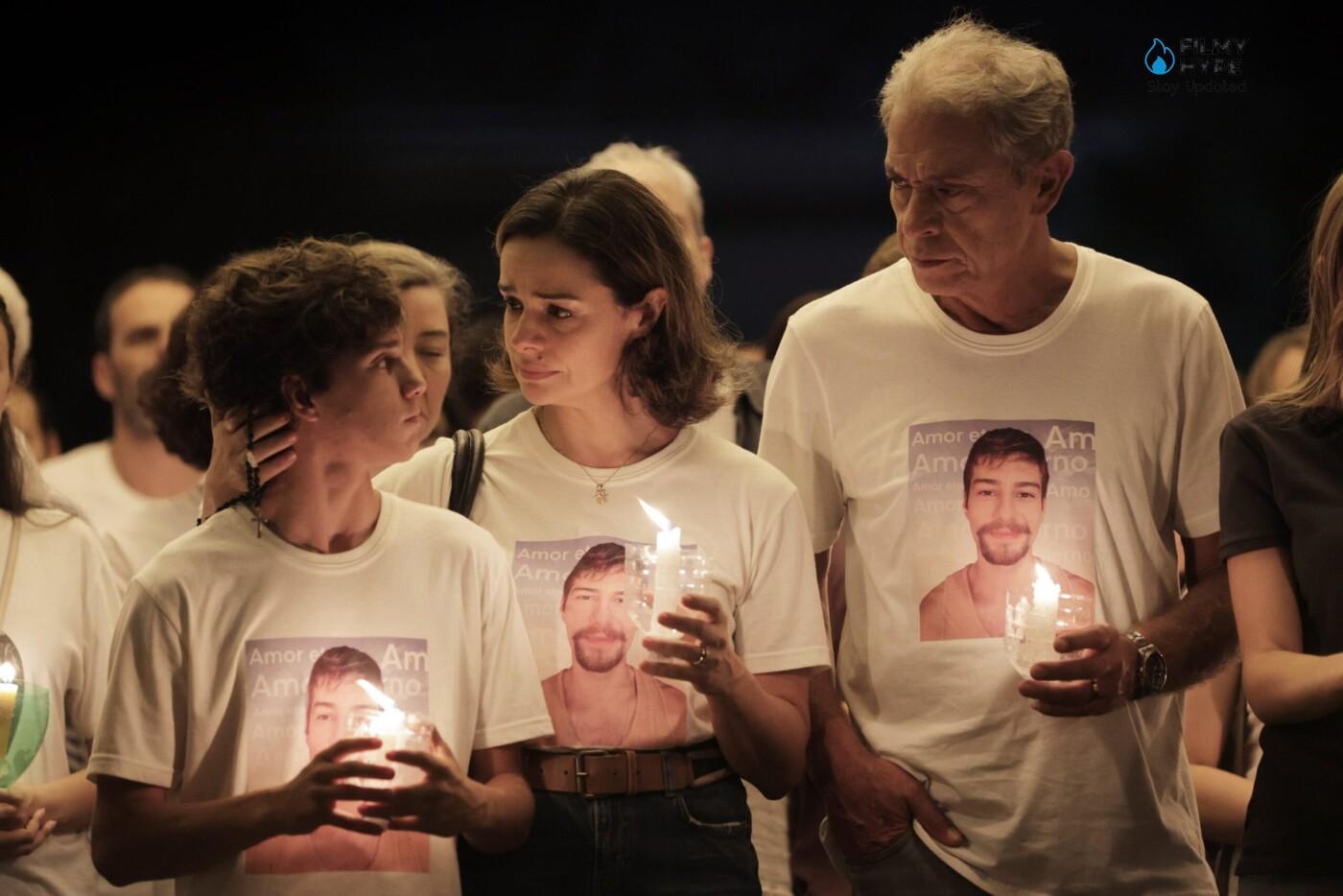The Endless Night Review: Netflix Series Through the Eyes of The Victims
Cast: Thelmo Fernandes, Paulo Gorgulho, Bianca Byington, Leonardo Medeiros, Debora Lamm
Director: Julia Rezende and Carol Minem
Streaming Platform: Netflix
Filmyhype.com Ratings: 3.5/5 (three and a half stars)
The Endless Night (Todo Dia a Mesma Noite in original) is a new 5-episode Netflix miniseries, directed by Carol Minêm and written by Gustavo Lipsztein which is inspired by the book The Endless Night: The Untold Story of Kiss Nightclub, written by journalist Daniela Arbex. At the center of the story, is the tragic night between 26 and 27 January 2013 which saw a terrible fire break out in the Kiss nightclub in Santa Maria in Brazil, causing 245 deaths and 630 injuries. The Endless Night tells the story from several points of view, giving a complete picture of this story which, however, lingers, in a pressing way, on pathos and sentimentality, not finding a balance with historical reality. In our review of the series, arriving on the streaming platform on January 25, 2023, we also try to frame the show which, between legal drama, crime, and more classic drama, does not have a precise line.

10 years after the devastating fire of the Kiss nightclub, which took place in Santa Maria in Brazil between 26 and 27 January 2013, Julia Rezende and Carol Minem are positioned in the control room to direct the night that will never pass, a 5-episode miniseries from the book The Endless Night: The Untold Story of Kiss Nightclub, by author Daniela Arbex. The Kiss tragedy shocked the entire continent at the time, so much so that it occupied a large part of international news programming. As many as 242 young people died as a result of the fire that broke out in the room, at least according to what the police reported, causing many injuries among the 2,000 people present.
The Endless Night Review: The Story Plot
2013, Santa Maria, Brazil. Some young people including Mari (Manu Morelli), Marco (Sandro Aliprandini), Felipinho (Miguel Roncato), and Guilherme (Luan Vieira), get ready in their respective homes to go and spend the evening at Kiss, a disco in the city that has organized a university party and in which the Gurizada Fandangueira band performs. At the beginning of the party, the venue hosts approximately 2,000 young people, exceeding the maximum capacity limit. While the concert becomes livelier and more engaging, the singer of Gurizada lights fireworks to create an atmosphere in the hall and, without realizing it, burns the ceiling from which many flames start.

While the fire spreads, setting the disco on fire due to the flammable soundproof walls, chaos begins to be generated inside the Kiss, with all the participants who, between screams and terror, try to move towards an emergency exit that does not exist. Due to the inhalation of toxic smoke, which turns out to be cyanide, many of the boys die shortly after having managed to escape from that infernal circle, while others remain suffocated inside. The dead are counted as many as 242. Some relatives of the victims, following the incident, decide to shed light on the incident, starting an association that fights to bring to justice those responsible for the death of their children.
The Endless Night Review and Analysis
To what extent can the pain of mourning be represented? This is the question posed throughout The Endless Night, a hybrid series that intertwines true crime and legal drama, bringing them together in a dramatic and, at times, claustrophobic story. The news story brought forward by the directors, which shocked Brazil and the whole world in 2013, immediately clarifies its intent: it wants to emphasize the emotional sphere of the characters involved in the Kiss fire and does not want to worry about how much vision will be tragic and difficult to sustain. Starting from the disaster in the club, every single frame is loaded with a pathos so much compressed within the narrow frame of the streaming, as to explode and presumptuously take over all the events covered.
The story, aided by the episode titles, is divided into blocks, which announce to the viewer which segment of the drama they will go into. The incipit of The Endless Night leads us right from the start into the burning flames of the disco, showing us the first, but most tragic, point of view of the many in the story: that of the victims. A pain that we look at through the eyes of the young people trapped in the club and which subsequently spreads, like a reflection, in the agony of their parents. The first episode is among those with the most significant impact, excessively filled with agony and chaos that the camera is good at underlining. From that moment, it will not stop capturing disturbed, irregular, and frenetic images.

The dominant figure of The Endless Night is the pain of loss, and it inflames the whole narrative fabric of the series until its closure. A feeling deeply linked to the sense of mourning, which becomes more and more accentuated as the investigations continue and the resolution seems further away with every step. It is channeled into each character, it is presented in all its consuming force, and even floods most documentary moments, in which a more didactic scheme should prevail in favor of the news story. Although the excess of feelings sometimes affects the fluidity of the story, its presence is necessary for the most intimate, personal, and shocking layer of what happened to be shown. Probably, the choice of a drama shown at its maximum peak is inserted to build a profound relationship with the spectator who, on the other hand, joins the denunciation of a corrupt system and an irresponsible, greedy and selfish society.
And why then should we calibrate suffering? Who are we to choose how much others should suffer, how they should suffer, and how they should express pain? This is the only way we understand that there is no brake to be engaged, and there is no switch to be turned off. In front of the mourning that follows an injustice we would all be in the same devastating situation, and we would not like to be judged for how much pain we show or how many tears we shed. The directors want to express this human and atrocious side that cannot be regulated. And it is only through a real identification, which can be reached by pushing on emotion, that a wave can be created capable of not turning off the light on those victims who, as Pedro says, due to not having executed the guilty, can still rest in peace.
The Endless Night Review: The Last Words
The Endless Night manages to strike, for the content reported, the heart of the viewer, leading him to reflect on the often-wrong judicial system that fails to convict the criminals responsible for an enormous number of victims. Unfortunately, from the third episode onwards, both on a purely content and sensationalist level, one realizes how the narration and direction have several weak points, first of all, the imbalance of genres and secondly the too superficial and extreme approach of the crime and legal drama part. A work which, in conclusion, due to its discontinuity, does not find its path, even though it offers various interesting points for reflection.







